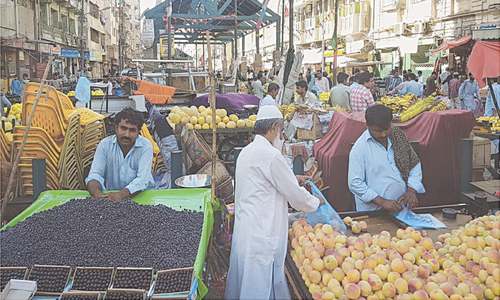THE Supreme Court has expressed its displeasure over the progress of certain development projects in Karachi and concern at the manner in which building permits have been granted by the regulatory authorities. Government officials have been reprimanded for not taking strict measures to curb the inappropriate utilisation of land along major corridors.
Karachi’s development and management issues are complex. But a careful review can lead to workable solutions.
Unfortunately, the key stakeholders are at loggerheads. No possibility of building a working relationship is apparent. Some months ago, the prime minister pushed for projects and federal interventions that possess cosmetic value. This was obviously done to provide cover for its lawmakers elected from Karachi, but who have not improved development. The Karachi Transformation Plan 2020 was launched in the wake of the devastating August 2020 rains. Very little progress has been made in its development outlay.
The provincial government, which commands the bulk of resources after the windfall allowed under the 18th Amendment, only uses the law to safeguard the status quo. It oversees development and management of a province which has a city that accounts for more than one-third of the provincial population and contributes over three-fourths of monetary and taxation resources to the provincial kitty. The Sindh government has left no stone unturned to frustrate the few federal attempts to launch any development venture, terming it a violation of constitutional provisions. Karachi’s local government tier nowadays exists as an extension of the provincial government. No LG polls are in sight.
Solutions can be worked out for the city.
The majority of planned and unplanned neighbourhoods are a sorry sight. With the exception of a few city roads, most arterial roads, link-ways, major streets and lanes are non-navigable for motorists. The situation of Karachi West is perhaps the worst. Long sections of the roads are no longer there. Ordinary folk, who commute using a shared rickshaw or rickety minibus, get injured due to the jolts received during the course of the journey. The absence of maintenance, poor design and quality of construction, frequent road-cutting and accumulation of sewage water have contributed to the dilapidated conditions.
Many accidents have occurred because of poor road conditions. Ambulances carrying critically ill patients have to brave the worn-out corridors. Talking to this writer, some Karachi residents indicated they have no faith in existing institutional arrangements to deliver the goods. They question the perception that democracy empowers the citizens to influence decision-making for the common public good. Most are disappointed with both government and opposition.
The city is plagued with haphazardly spread garbage. Healthcare professionals say that the scale and intensity of infectious diseases has increased manifold over the past few years. Meanwhile, the weight and volume of waste are increasing exponentially due to growing consumerism. Only a tiny fraction of this waste is disposed of — that too in an improper manner. The remaining is either left unattended or burnt causing more health hazards. One can find garbage burning in locations such as beaches and playgrounds. In the vicinity of large teaching hospitals, medical waste can be spotted in municipal dump sites. It comprises dangerous substances.
The city had a separate healthcare waste collection and disposal system many years ago. At present, it is not functioning properly. While the country and the globe is combating Covid-19, essentials like incinerators, already installed in some public-sector hospitals, must be overhauled and connected to the waste disposal chain of large and medium healthcare facilities.
Our planners must learn that infrastructure and services are essential to economic progress. Solutions are simple. Take the case of sewage. About 450 million gallons of untreated sewage per day is discharged into the sea. Development of small- and medium-scale sewerage treatment plants at the discharging ends of city nullahs can safeguard the marine environment. This enterprise can help generate recycled water for public horticulture and landscaping. Many of our water mains have completed their life and are prone to leakages and organised theft. Fixing leakages will save water.
Immediate rehabilitation of footpaths all along the major thoroughfares is key. While thousands of dwellings have been demolished along the nullahs and rivers, walkability along footpaths remains absent. The court has stressed the revival of the Karachi Circular Railway. But no answer has been provided as to how the authorities will bear the huge subsidy required to run the trains. Upgrading intra-city bus terminals, opening credit incentives for private transporters to procure buses and rationalising route permits can help streamline public transport.
The writer is an academic and researcher based in Karachi.
Published in Dawn, April 13th, 2021















































